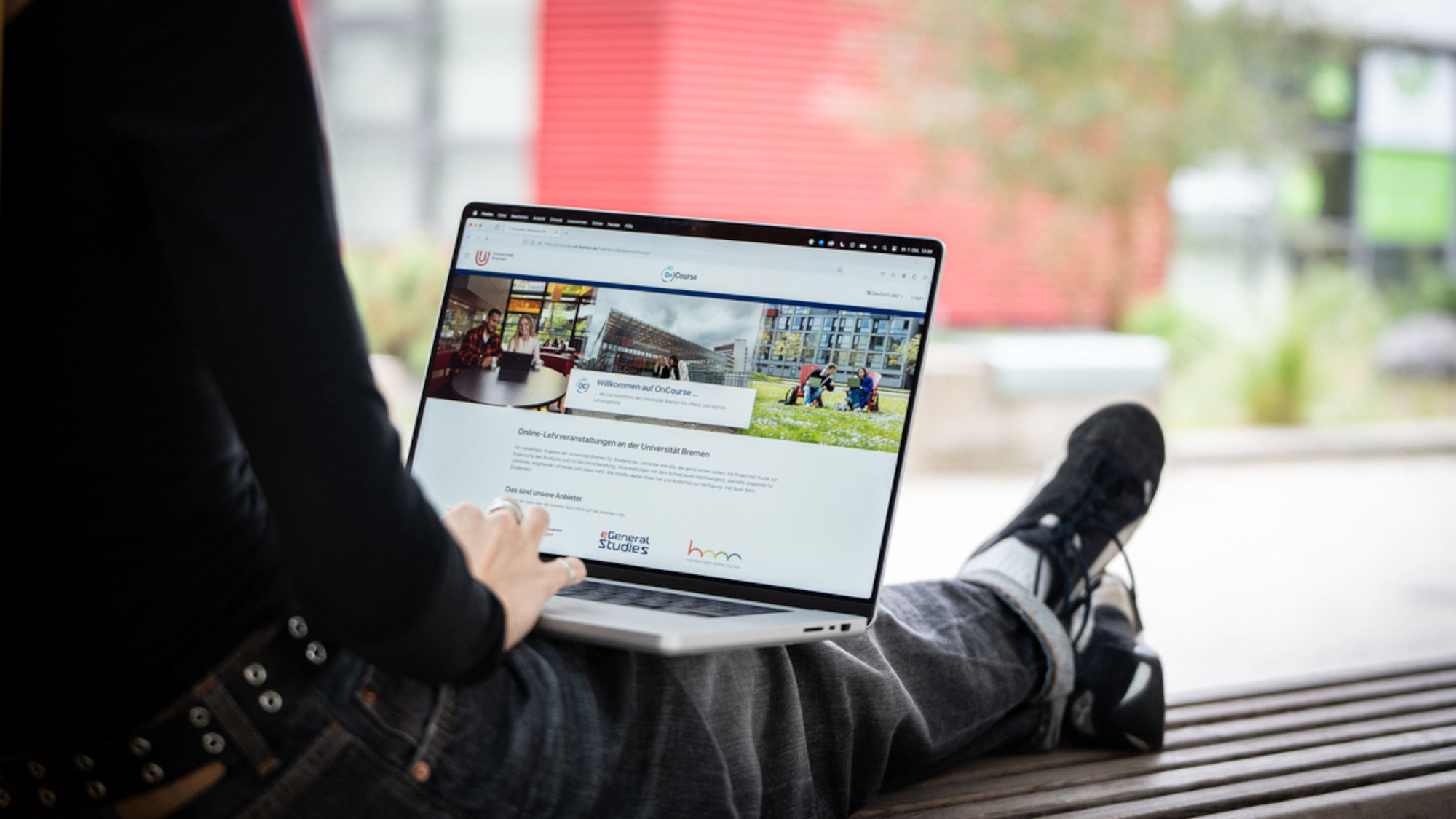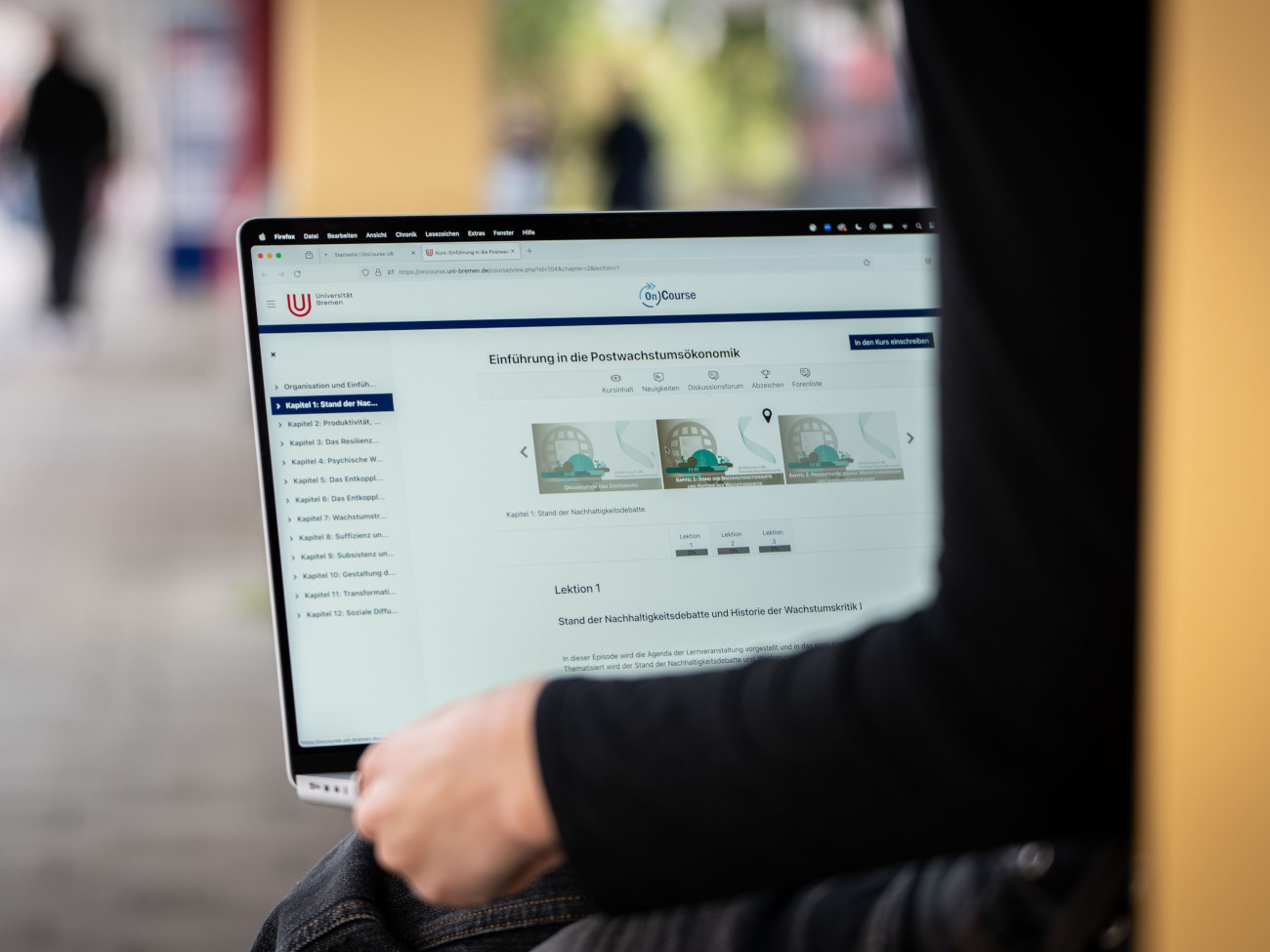
© Annemarie Popp / Universität Bremen
Broaden Your Academic Horizon: How the eGeneral Studies Program Opens up New Perspectives
Interactive formats, flexible exam dates, and exciting topics: These are the online eGeneral Studies courses
Think outside the box and acquire skills beyond your chosen subject – with eGeneral Studies. Flexible enough to fit into your personal university schedule, the digital offer is designed to meet students’ needs. We introduce you to the program.
Each degree program has its own curriculum with its own set of subjects and modules that you have to complete in order to obtain your qualification at the end. In addition, you can complement your program with “supplementary studies.” This means you can take extra-curricular courses to develop your own skills further. On top of the in-person General Studies courses, there is also a digital program: eGeneral Studies, “eGS” for short. Developed by the Center for Multimedia in Higher Education (ZMML) together with teaching staff, this program adds even more flexibility. “Our focus is on meeting the students’ needs,” says Dr. Christiane Bottke from ZMML. “Our courses are entirely digital, so students can access them anywhere and at any time. They only need to come to the test center on campus to take the exam.” Students can choose the exam date flexibly almost every month, and registration and cancellations are possible at short notice. Three credit points can be earned for each course.
What Can Students Expect from the eGS Program?
“Students can attend eGeneral Studies courses completely virtually and we make sure that there is a wide range of subjects to choose from. Videos are each around 20 to 30 minutes long and there are also text documents, audio files, and quizzes to check your own learning progress,” explains Christiane Bottke. The topics cover a broad range of disciplines and are constantly being expanded. We took a closer look at three of the courses:
Diversity Competencies
The “Diversity Competencies” course encompasses a multifaceted exploration of discourses and action related to the subject of diversity. The course’s objectives are not only to make participants aware of the social dimensions of inequality, power, and discrimination, but also for them to develop a diversity-conscious attitude and empower them to voice criticism in cases of injustice. The video-based course can also be watched in sign language.
Human-Induced Climate Change
The “Human-Induced Climate Change: Causes, Effects, and Solutions” course addresses current challenges of global warming. The course was developed together with Students for Future at the University of Bremen and can be taken for the first time in the 2024/2025 winter semester. When creating the digital format, the team was guided by an extended educational concept that is less video-centered and combines various formats such as texts and graphics with interactive content. At the end of each lesson, students can check and consolidate their acquired knowledge by completing an exercise or by listening to a podcast.

© Annemarie Popp / Universität Bremen
Introduction to Post-growth Economics
The “Introduction to Post-Growth Economics” course deals with criticism and limits of economic growth. It identifies possible solutions and transformations. The participants gain knowledge about the current economy, an awareness of its inherent problems, and the skills to develop alternative solutions. The lessons are concluded with a short quiz for students to check their own understanding of the topic.
Services for Students
As soon as students feel that they have a good understanding of the subject matter, they can register for an exam at the test center. All students from Bremen State and the University of Oldenburg can take part in the examinations. ZMML also offers comprehensive student support. “We try to answer questions within 24 hours,” says Christiane Bottke. “In the winter semester, we also plan to offer a digital consultation service, which many students have requested.” In general, being in touch with students is very important to the team. “They are our target group and we develop our offers and services for them. We are therefore always happy to receive feedback, regularly ask for what we can change, and try to implement requests as best we can.”
Support for Teaching Staff
ZMML is also there to support teaching staff in all kinds of areas, from planning courses together and producing them in the in-house studio, to receiving ongoing support. “eGeneral Studies were originally set up by lecturers and university staff,” explains Bottke. “They wanted to offer courses digitally and in a more flexible manner. eGS give lecturers more flexibility and visibility for their own work.” Teaching staff can contact ZMML directly any time if they are interested in the program.
More Information
The eGeneral Studies program
General information for teaching staff and students